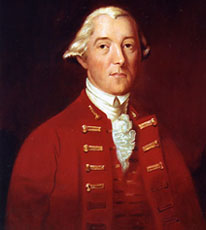When the Seven Years’ War (also known as the “French and Indian War”) ended with the Treaty of Paris in 1763, Britain began to impose taxes on its colonies in America to help pay for the War and for the ongoing costs of defence.
|
With Canada (the former New France) now in British hands, the colonists saw no reason to pay these taxes, particularly because they had no elected representative in the British Parliament in London. “No taxation without representation” became a popular slogan, especially in the Thirteen Colonies along the Atlantic seaboard south of Canada.
There were other grievances as well. The Royal Proclamation of 1763 prohibited the colonists from settling west of the Appalachian Mountains, reserving those lands for the First Nations. The Navigation Acts restricted colonial maritime commerce. The Quebec Act of 1774, strongly supported by the Governor of Quebec, Sir Guy Carleton, also outraged many in the Thirteen Colonies. It extended the boundaries of Quebec to the Ohio River, granted toleration of the Roman Catholic religion and preserved the French civil law and seigneurial system of landowning in the province to the north. In addition, some colonists began to think of themselves as “American” rather than “English”, and to dream of independence from Britain.
Next Chapter ->